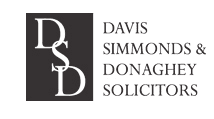Complaints
Raising a Complaint
In the first instance it may be helpful to contact the person who is working on your case to discuss your concerns and we will do our best to resolve any issues at this stage. If you would like to make a formal complaint, then you can read our full complaints procedure below:
A complaint is an oral or written expression of dissatisfaction which alleges that the
complainant has suffered (or may suffer) financial loss, distress, inconvenience or other
detriment.
The Partners and the named supervising Partner in the client care letter are ultimately
responsible for the service delivered to our client, but it is the fee earner with conduct that
the complaint is initially sent to. It is acknowledged that a complaint can be received in many
different ways, either in writing or verbally, initially the fee earner with conduct of the matter
will discuss with the client the cause of the dissatisfaction and the action to be taken. The
response to the complaint and the resolution or the outcome will be recorded on the file and
it is the firm’s practice to tackle any complaints speedily, sympathetically and effectively,
offering redress as appropriate and/or an apology if appropriate.
It must be noted that in the area of work handled that lay clients are often emotional, may
have mental health, drug, alcohol or other social problems. Abuse or expressions of
dissatisfaction with the client’s situation, eg: the existence of concerns of Social Services, are
not considered to be complaints within this section. If clients are persistently abusive, the
practice may consider refusing to continue to act.
If the complaint cannot be handled at the initial stage it is referred to the complaints handling
partner for that fee earner who will:-
• Within one week acknowledge the complaint and will confirm to the client that they
will receive a response within 3 weeks;
• Consider the written complaint (if any) or any note of the complaint;
• If the client has asked for an interview, arrange the same or organise an interview if
the terms of the complaint are unclear;
• Provide a written response to the complaint within 3 weeks.
If the complaint handler considers the firm has provided an adequate service then he/she will
write to the client explaining this and at the same time inform the client that if the client is not
satisfied with that decision then the client can refer the matter to the Legal Ombudsman.
If the complaint handler considers that the firm has provided inadequate professional
service, then consideration will be given to compensation or a reduction of costs. Any offer
made to redress the client’s loss will be recorded on the file and if the offer is accepted, the
complaint will be closed. If the offer is not accepted the complaint handler will explain the
procedure for referring the matter for adjudication by the Legal Ombudsman.
The firm will co-operate in any investigation by the Legal Ombudsman and will promptly
notify the insurers of any potential claims.
Any identified complaints are recorded on the file and complaints that have moved to Stage 2
are kept on the file together with a copy on the Central Complaints Register.
In each case of complaint, consideration is given as to any necessary changes in system or
practice to prevent future similar problems. Complaints are considered at business reviews.
Any claims on the firms indemnity insurance and the findings of the Legal Ombudsman for
any matter (whether publicly funded or not) will be reported to the Legal Aid Agency.
Making a complaint will not affect how we handle your case.
What do to if we cannot resolve your complaint?
The Legal Ombudsman can help you if we are unable to resolve your complaint ourselves. They will look at your complaint independently and it will not affect how we handle your case.
Before accepting a complaint for investigation, the Legal Ombudsman will check that you have tried to resolve your complaint with us first. If you have, then you must take your complaint to the Legal Ombudsman:
· Within six months of receiving a final response to your complaint and
· No more than six years from the date of act/omission; or
· No more than three years from when you should reasonably have known there was cause for complaint.
If you would like more information about the Legal Ombudsman, please contact them.
Visit: www.legalombudsman.org.uk
Call: 0300 555 0333 between 9am to 5pm
Email: enquiries@legalombudsman.org.uk
Postal: The Legal Ombudsman, PO Box 6167
Slough SL1 0EH
DSD Law is authorised and regulated by the Solicitors Regulation Authority, our Firm ID No. is 266782.
The Solicitors Regulation Authority can help you if you are concerned about our behaviour.
This could be for things like dishonesty, fraudulent use of your money or treating you unfairly because of your age, a disability or other characteristic.
You can raise your concerns with the Solicitors Regulation Authority.
Visit: www.sra.org.uk
Call: 0370 606 2555 between 8am to 5pm (Tues 9.30am to 5pm)
Solicitors Regulation Authority, The Cube, 199 Wharfside Street, Birmingham, B1 1RN

Authorised & Regulated by the SRA, Firm ID 266782





